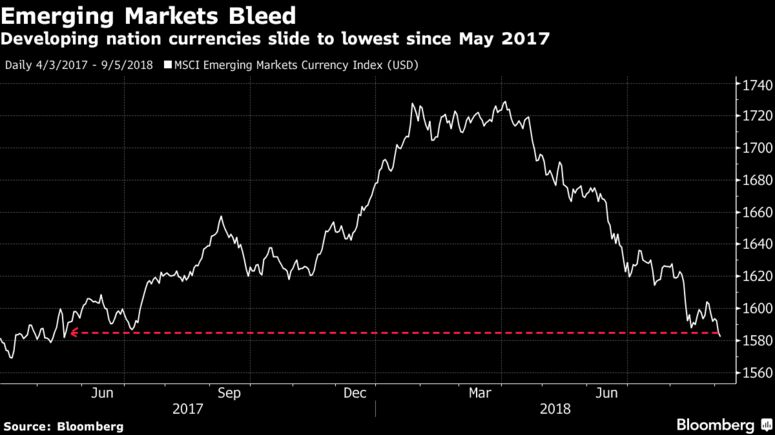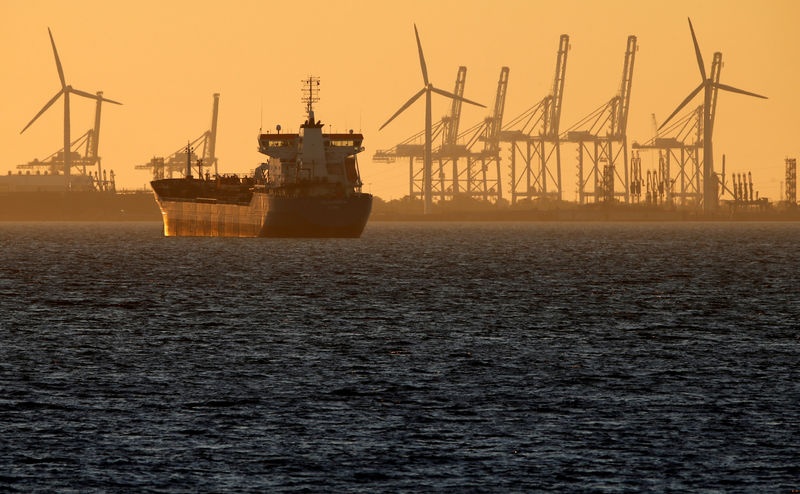Emerging-market assets have further scope to fall, thanks to investors who have been reluctant so far to cut their positions on what's been one of the most popular trades of recent years.
Fund-manager positions are one of the reasons keeping Morgan Stanley's James Lord bearish, even after the MSCI Emerging Market Currencies Index fell to a fresh one-year low. The pressure on developing nations Wednesday rotated into equities, with Hong Kong's benchmark down almost 1 percent and Jakarta's and Manila's sliding nearly 2 percent.
"We stick to a bearish view across credit, rates and FX, and hold short positions across most of the high-beta space, including Indonesia and Malaysia, which are two countries we expect investors to increasingly focus on," Lord and fellow Morgan Stanley strategists wrote in a report Tuesday.
Five years on from the taper tantrum, when worries about a rollback in U.S Federal Reserve stimulus hit riskier assets, emerging economies are beset by the Fed's accelerating destruction of liquidity as it normalizes policy. That's sent funding costs up around the world, casting a pall over countries that have enjoyed faster growth than in developed nations.
"Real money positioning is not yet clean and broader external funding challenges are high," Morgan Stanley analysts concluded, using a term for non-leveraged institutional investors such as mutual and pension funds.
The worst hit nations have been those with the weakest fundamentals. South Africa's rand led global declines Tuesday as data showed its economy fell into a recession. Turkey's lira slid amid concern the nation's central bank will underwhelm investors at its policy meeting next week, while the Argentine peso slumped to a record and Indonesia's rupiah sank to the lowest in two decades even after the central bank intensified its fight to protect it.
JP Morgan Chase & Co. analysis suggests that while investors have largely cut back on their local-currency bond holdings in emerging markets, there's scope for further pullback in stocks and fixed income denominated in dollars and other developed-country currencies.
"EM local currency bond managers appear to have been mostly responsible for the recent EM correction,: JP Morgan strategist including Nikolas Panigirtzoglou wrote in a note Friday. Their analysis showed that active bond-fund managers "abruptly" unwound their positions in local emerging debt last month after building up overweight positions in July. The reversal was so big that it probably amounted to "capitulation," they wrote.
Equity managers, on the other hand, "are far from capitulation territory," having also shifted into an overweight position in July, according to JPMorgan.
"Active EM equity and hard-currency bond fund managers continued to exhibit rather elevated betas during August, suggesting that the EM equity and hard-currency bond universe are more vulnerable in the event of re-escalation in the U.S.-China trade conflict into September, " the JPMorgan team concluded.
For Khiem Do, co-head of Asian multi-asset strategy at Baring Asset Management, there's likely to be more turmoil in the absence of the Fed pulling back on the speed of its policy tightening. And that looks unlikely, bond markets indicate.
"If the Fed were to pause. this would be fantastic news for the EM," he said in a Bloomberg TV interview from Hong Kong. "But the Fed is likely going to hike rates again in September. December we're not sure, they may pause. As soon as they pause, that would be a massive relief for emerging markets."
Source



